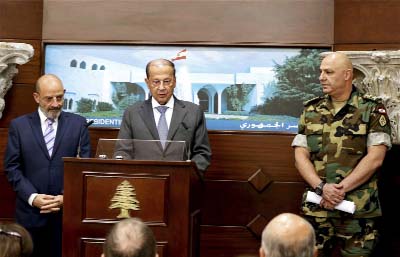
AP, Beirut :
U.S. airstrikes blocked the advance of an Islamic State convoy carrying militants toward Iraq on Wednesday, derailing a Hezbollah-negotiated deal that removed the extremists from the Lebanon-Syria border, where they have been for years.
The airstrikes came amid U.S. criticism of the deal, reflecting a growing outrage within the Trump administration over the decision to give the militants safe passage from the battlefield instead of killing them, and Iran-backed Hezbollah’s leading role in it.
The developments also were an embarrassment for the U.S.-backed Lebanese military, which agreed to the deal and had declared victory over the militants. U.S. officials said the airstrikes to disrupt the fleeing militants were intended to send a strong signal that the deal, while helping to clear IS from the border, undermined a broader U.S.-led strategy for defeating the group in Syria and Iraq.
More than 48 hours after they left the Syria-Lebanon border for eastern Syria, the buses carrying 300 militants and almost as many of their relatives were stuck in a desert area on the outskirts of the largely IS-held Deir el-Zour province near the frontier with Iraq.
It is not clear how the standoff will be resolved. Syrian activists say alternate routes are being considered to bring the militants to Boukamal, an IS-controlled town on the Iraqi border, according to the agreement.
But officials of the U.S.-led coalition said they will continue to monitor the convoy and aren’t ruling out more airstrikes.
“Irreconcilable (IS) terrorists should be killed on the battlefield, not bused across Syria to the Iraqi border without Iraq’s consent,” according to a tweet from Brett McGurk, the top U.S. envoy for the anti-Islamic State coalition.
The evacuation deal followed separate but simultaneous weeklong offensives by the Lebanese army on one side of the border and by the Syrian government and Hezbollah on the other. Hezbollah has thousands of fighters shoring up the forces of President Bashar Assad.
Iraq also reacted angrily to the evacuation, with its president saying that moving the militants to the Iraqi-Syrian border was an “insult.”
Later Wednesday, the coalition said its warplanes struck a small bridge and cratered a road to hinder the convoy without targeting the evacuees. Airstrikes also hit a separate group of IS militants traveling to meet the convoy, according to Col. Ryan Dillon, a coalition spokesman.
Responding to the criticism but not addressing the airstrikes, Hezbollah leader Hassan Nasrallah said in a statement that negotiating with the militants was the “only way” to resolve the “humanitarian and national” issue of finding the remains of nine Lebanese soldiers that the militants kidnapped in 2014.
Hezbollah is a significant player in Lebanon with government ministers and lawmakers, while the role of its fighters also has been growing in Syria.
The Syrian government, backed by Russian air power and Iranian-organized militias including Hezbollah, has focused its military campaign in recent weeks on Deir el-Zour, where government troops have been besieged for years in the provincial capital.
U.S. airstrikes blocked the advance of an Islamic State convoy carrying militants toward Iraq on Wednesday, derailing a Hezbollah-negotiated deal that removed the extremists from the Lebanon-Syria border, where they have been for years.
The airstrikes came amid U.S. criticism of the deal, reflecting a growing outrage within the Trump administration over the decision to give the militants safe passage from the battlefield instead of killing them, and Iran-backed Hezbollah’s leading role in it.
The developments also were an embarrassment for the U.S.-backed Lebanese military, which agreed to the deal and had declared victory over the militants. U.S. officials said the airstrikes to disrupt the fleeing militants were intended to send a strong signal that the deal, while helping to clear IS from the border, undermined a broader U.S.-led strategy for defeating the group in Syria and Iraq.
More than 48 hours after they left the Syria-Lebanon border for eastern Syria, the buses carrying 300 militants and almost as many of their relatives were stuck in a desert area on the outskirts of the largely IS-held Deir el-Zour province near the frontier with Iraq.
It is not clear how the standoff will be resolved. Syrian activists say alternate routes are being considered to bring the militants to Boukamal, an IS-controlled town on the Iraqi border, according to the agreement.
But officials of the U.S.-led coalition said they will continue to monitor the convoy and aren’t ruling out more airstrikes.
“Irreconcilable (IS) terrorists should be killed on the battlefield, not bused across Syria to the Iraqi border without Iraq’s consent,” according to a tweet from Brett McGurk, the top U.S. envoy for the anti-Islamic State coalition.
The evacuation deal followed separate but simultaneous weeklong offensives by the Lebanese army on one side of the border and by the Syrian government and Hezbollah on the other. Hezbollah has thousands of fighters shoring up the forces of President Bashar Assad.
Iraq also reacted angrily to the evacuation, with its president saying that moving the militants to the Iraqi-Syrian border was an “insult.”
Later Wednesday, the coalition said its warplanes struck a small bridge and cratered a road to hinder the convoy without targeting the evacuees. Airstrikes also hit a separate group of IS militants traveling to meet the convoy, according to Col. Ryan Dillon, a coalition spokesman.
Responding to the criticism but not addressing the airstrikes, Hezbollah leader Hassan Nasrallah said in a statement that negotiating with the militants was the “only way” to resolve the “humanitarian and national” issue of finding the remains of nine Lebanese soldiers that the militants kidnapped in 2014.
Hezbollah is a significant player in Lebanon with government ministers and lawmakers, while the role of its fighters also has been growing in Syria.
The Syrian government, backed by Russian air power and Iranian-organized militias including Hezbollah, has focused its military campaign in recent weeks on Deir el-Zour, where government troops have been besieged for years in the provincial capital.

